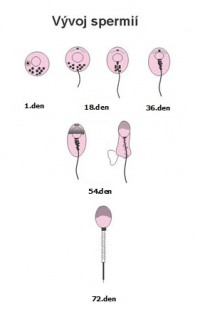Examination Methods for Men
- Spermiogram (semen analysis) and cultivation-based ejaculate;
- Hyaluronan Binding Assay (HBA);
- Immunology tests;
- Genetic tests;
- Urological examination in case of more severe spermiogram abnormalities.
Spermiogram ...
A spermiogram is the fundamental method used for evaluating male fertility. The procedure involves a microscopic analysis of the semen. The quality and the quantity of the sperms in the ejaculate are evaluated in a laboratory environment.
The assessed parameters mainly include:
- Ejaculate volume
- Sperm count (concentration) in 1 ml of semen
- Total sperm count in ejaculate
- Sperm motility
- Motility quality
- Normal shaped sperm ratio
- Ejaculate pH
- Agglutination – sperm clumping due to presence of antibodies
- Viscosity – liquid flow
The semen is either collected directly at our centre or, upon previous arrangement, it may be delivered from home, in which case, however, the semen sample has to be transported at a temperature corresponding to the human body, i.e. at a temperature range from 20 to 37°C, and it has to be delivered as soon as possible (within one hour from collection).
Prior to the semen sample collection, the male partner should abstain from sexual intercourse for 2 to 7 days (ideally for 3 - 4 days) to ensure the maximum quality of the collected semen. Shorter sexual abstinence could reduce the sperm count and the semen volume. Longer abstinence, on the other hand, decelerates the sperm motility.
The spermiogram results may be unfavourably affected by a number of factors, such as stress, mental problems, worries about poor test results, improper diet and lifestyle, obesity, excessive workout, excessive alcohol consumption, febrile conditions, frequent bathing in hot water, sauna, or warm and tight underwear.
In order to improve the spermiogram results, it is recommended to use preparations containing zinc, selenium, and vitamins, i.e. vitamins E and C. Furthermore, we recommend clients to adjust their diet and lifestyle, to avoid stress or smoking, and to get enough fresh air and exercise.
Hyaluronan Binding Assay (HBA) ...
The procedure involves a functional sperm analysis. The technique is used to determine the natural fertilisation abilities of sperms. A mature sperm capable of fertilisation produces surface receptors that can detect an egg and penetrate into it. A sperm with intact genes binds more easily to a specific substance called hyaluronan. Thanks to this substance, it is possible to better simulate the egg surface and thereby, to almost precisely determine the number of mature and genetically intact sperms.
When a sperm selected in this manner is injected into an egg, the probability of fertilisation is higher than with a sperm selected based on its morphology and motility.
Our Centre for Assisted Reproduction offers natural sperm fertilisation ability testing as a complementary parameter to standard semen analyses.
When the HBA test results are normal, the sperm function is also normal and the couple has a good chance of successful egg fertilisation by assisted reproduction methods. If the test results are not as good, PICSI is recommended to couples undergoing extracorporeal fertilisation as it considerably increases their chances of impregnation, while reducing the number of pregnancy failures (spontaneous miscarriages).
Immunology Tests ...
The fundamental method used for evaluating male fertility is the spermiogram. The presence of agglutinations, i.e. small sperm clumps detected during semen analysis, may point to an immune-related fertility disorder.
Various immunology test methods are used to examine the presence of sperm antibodies in the ejaculate and in the blood.
Immune-related infertility in men may be caused by a defect of the protective barrier separating the testicles from the immune system. This can happen, for example, as a result of testicular injury, inflammation, or a tumorous disease. As soon as the immune system cells come into contact with unknown tissues, they react to them as though they are foreign tissue. Subsequently, the immune systems starts producing antibodies against the body's own sperms. The antibodies change the concentration, motility and the shape of the sperms and these are no longer capable of passing through the cervical mucus on their way to the egg to fertilise it.
For more information go to http://www.genetika-plzen.cz/reproductive-immunology
Genetic Tests ...
A fertility disorder may be caused or affected by hereditary disorders. Many of them may be ascertained by genetic tests. Their results serve as the basis for selecting the proper infertility treatment that would ensure maximum success and minimise the risk of the passing of a hereditary disease to the child.
Genetic testing embraces a wide array of examination methods, with more and more diagnostic tests for different hereditary diseases and disorders introduced every day.
In relation to infertility disorders, the basic examinations are a genetic consultation and a karyotype analysis, i.e. the determination of the chromosome number and type. In case of spermiogram abnormalities, we recommend the male client to undergo a cystic fibrosis mutation analysis and a Y chromosome microdeletion test.
For more information go to http://www.genetika-plzen.cz/medical-genetics




